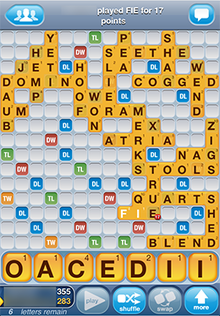
Scrabble is a word game in which two to four players score points by placing tiles, each bearing a single letter, onto a game board divided into a 15×15 grid of squares. The tiles must form words that, in crossword fashion, read left to right in rows or downward in columns and are included in a standard dictionary or lexicon.

Upwords is a board game. It was originally manufactured and marketed by the Milton Bradley Company, then a division of Hasbro. It has been marketed under its own name and also as Scrabble Upwords in the United States and Canada, and Topwords, Crucimaster, Betutorony, Palabras Arriba and Stapelwoord in other countries. It is currently available as a board game and a digital gaming app.

Anagrams is a tile-based word game that involves rearranging letter tiles to form words.

Boggle is a word game introduced in 1972 and in which players try to find as many words as they can from a grid of lettered dice, within a set time limit. It was invented by Allan Turoff and originally distributed by Parker Brothers.
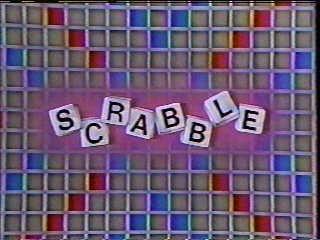
Scrabble is an American television game show based upon the board game Scrabble. Contestants competed in a series of rounds to fill in words within a crossword puzzle for cash. Muriel Green of Exposure Unlimited developed the idea for a television game show based upon the board game concept. During 1983, Green convinced Selchow and Righter, who at that time owned the Scrabble board game, to license Exposure Unlimited to produce the game show. Exposure Unlimited co-produced the show with Hasbro Studios, Reg Grundy Productions, and licensed the show to NBC. Scrabble aired on NBC from July 2, 1984, to March 23, 1990, and again from January 18 to June 11, 1993. Chuck Woolery hosted the program. Jay Stewart was the announcer for the first year. Charlie Tuna replaced him in mid-1985 and remained through the original run and the entirety of the 1993 revival.

Super Scrabble is a board game introduced in 2004 and a variant of Scrabble. It is played on a 21×21 grid board instead of Scrabble's usual 15×15, and uses twice as many letter tiles.
Scrabble variants are games created by changing the normal Scrabble rules or equipment.
In Scrabble, a challenge is the act of one player questioning the validity of one or more words formed by another player on the most recent turn. In double challenge, if one or more of the challenged words is not in the agreed-upon dictionary or word source, the challenged player loses her/his turn. If all challenged words are acceptable, the challenger loses his/her turn.

Tile tracking is a technique most commonly associated with Scrabble and similar word games. It refers to the practice of keeping track of tiles played on the game board, typically by crossing them off a score sheet or tracking grid as they are played. Tracking tiles can be an important strategic aid, especially during the endgame, when there are no tiles left to draw and tracking allows each player to deduce the tiles on their opponent's rack. The marking off of each letter from a tracking grid as the tiles are played is a standard feature of tournament play.
English-language Scrabble is the original version of the popular word-based board game invented in 1938 by US architect Alfred Mosher Butts, who based the game on English letter distribution in The New York Times. The Scrabble variant most popular in English is standard match play, where two players compete over a series of games. Duplicate Scrabble is not popular in English, and High score Scrabble is no longer practised.
Lexulous is an online word game based on the commercial board game Scrabble. It is run by an Indian company of the same name on a dedicated website, and is also available within the social networking site Facebook.
A number of related games under the Yahtzee brand have been produced. They all commonly use dice as the primary tool for game play, but all differ generally. As Yahtzee itself has been sold since 1954, the variants released over the years are more recent in comparison, with the oldest one, Triple Yahtzee, developed in 1972, eighteen years after the introduction of the parent game.

Bananagrams is a word game invented by Abraham Nathanson and Rena Nathanson of Cranston, Rhode Island, wherein lettered tiles are used to spell words.

Scrabble ME is a variation of the classic board game Scrabble, where each player plays on their own small board as it is opposed to all players playing on one main shared board. It was published by Winning Moves Games USA in 2008.

The Computer Edition of Scrabble, also known as Computer Scrabble is a computer version of the board game Scrabble, licensed from J. W. Spear & Sons and released by Little Genius for the Apple II in 1982. It was subsequently released for most home computers of the time.

Scrabble Showdown is an American game show created for the American cable network The Hub. The program was based on the board game Scrabble and was hosted by Justin Willman. It ran from September 3, 2011, to April 15, 2012.
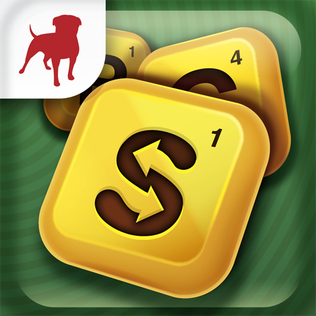
Word Streak is a word game developed by Zynga with Friends for iOS and Android and released in January 2012. Gameplay is similar to that of Boggle—players try to find as many words as possible in a jumbled 4x4 grid of letters by connecting adjacent letters to form words within a two-minute time frame - though with extra features and a different scoring system. Words may be formed vertically, horizontally, and diagonally. Scramble with Friends is one of the top ranking games in the iOS application store, available as both a free ad-supported version and an ad-less paid version. Scramble with Friends replaced Scramble Challenge at the end of 2011, but did not retain the solitaire option of the latter.

Draw Something was a video game developed by OMGPop based on its browser game Draw My Thing, launched on February 6, 2012. It won a Flurry App Spotlight Award in 2012. In the first five weeks after its launching, the game was downloaded 20 million times. On March 21, 2012, both Draw Something and OMGPop were bought by the gaming company Zynga for $180 million. The game's popularity peaked on the day of the sale at 15 million daily active users, and the number has been dropped to 10 million by early May.
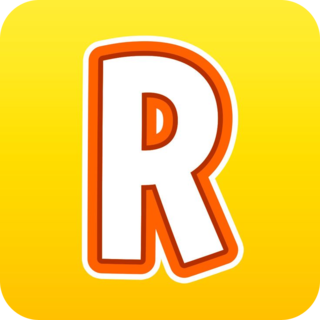
Ruzzle is a mobile game developed by Swedish gaming company MAG Interactive and was first published in the Apple Store in March 2012. Ruzzle is inspired by the classic board games Boggle and Scrabble. The game is highly social and based on online matches, requiring the player to find an opponent who can be appointed randomly by the system from online users, chosen from a list of friends set by the player, or selected from amongst their Facebook friends. Ruzzle is now available for iOS, Android, and Windows Phones.
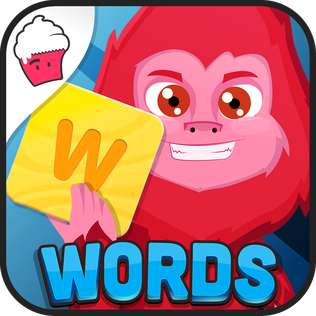
Words of Gold is a multiplayer word game developed by Cupcake Entertainment. It was released in November 2014 for Facebook, December 2015 for Android, and February 2016 for iOS.

